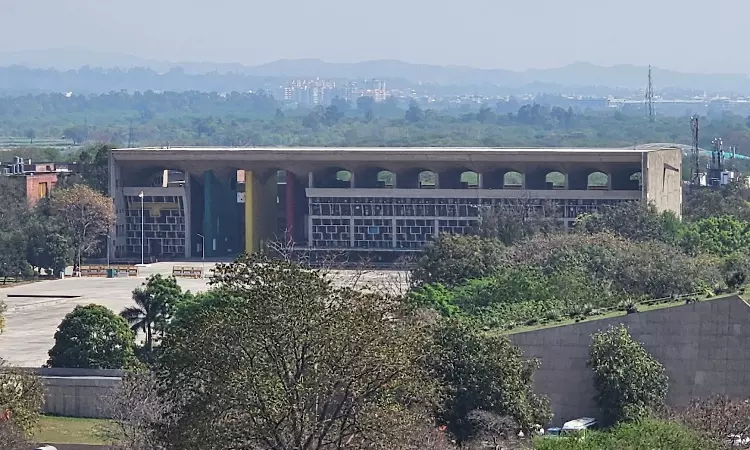- Home
- /
- High Courts
- /
- Punjab and Haryana High Court
- /
- Magistrate/ Sessions Court...
Magistrate/ Sessions Court Competent To Grant Default Bail Even If Regular Bail Plea Pending Before HC : Punjab & Haryana High Court
Aiman J. Chishti
13 Aug 2025 7:15 PM IST
In a significant ruling, the Punjab and Haryana High Court has clarified that a Magistrate or the Sessions Court, as the case may be, retains the competence to grant default bail to an accused, even when a regular bail application is pending before a Sessions Court or the High Court. The development comes while hearing a regular bail plea wherein during the pendency of the application,...
In a significant ruling, the Punjab and Haryana High Court has clarified that a Magistrate or the Sessions Court, as the case may be, retains the competence to grant default bail to an accused, even when a regular bail application is pending before a Sessions Court or the High Court.
The development comes while hearing a regular bail plea wherein during the pendency of the application, the accused completed 3 months and default bail was granted by the Magistrate under Section 167(2) CrPC, which corresponds to Section 187(3) BNSS.
The Court said,
"even when the regular bail petition was pending before the High Court, the Sessions Court is competent to grant default bail, also known as compulsive bail or statutory bail, and similarly the Magistrate is competent to grant default bail even when the regular bail petition was pending before the Sessions Court or the High Court."
Reliance was placed on catena of judgements including M Ravindran v Intelligence Officer, Directorate of Revenue Intelligence to underscore that, the right to be released on default bail continues to remain enforceable if the accused has applied for bail, notwithstanding pendency of the bail application; or subsequent filing of the chargesheet or a report seeking extension of time by the prosecution before the Court; or filing of the chargesheet during the interregnum when challenge to the rejection of the bail application is pending before a higher Court.
The Court also referred to Bikramjit Singh v. The State of Punjab, (2020) wherein the Supreme Court held that, "The right to default bail, as has been correctly held by the judgments of this Court, are not mere statutory rights under the first proviso to Section 167(2) of the Code, but is part of the procedure established by law under Article 21 of the Constitution of India, which is, therefore, a fundamental right granted to an accused person to be released on bail once the conditions of the first proviso to Section 167(2) are fulfilled."
The judge observed that, "The statutory right of default bail originates from the fundamental rights guaranteed to every individual within the territories of India."
Even if there are any specific rules and instructions which require that whenever a bail petition is filed before any Court, the pendency of the bail petition before the High Court must be brought to the notice of the concerned Court, still no such Rules, Orders, or Instructions can even slightly dilute or negate the statutory powers of Magistrates and Sessions Court to grant default bail because these are deeply imbedded in the fundamental rights guaranteed by the Constitution of India, it added.
The Court opined that, powers conferred under Section 167(2) CrPC or Section 187(2) of BNSS do not eclipse unless the police report is filed within the timeframe as specified by the Legislature.
It further explained that, "The right of default bail granted under Section 187(2) BNSS, 2023, which corresponds to Section 167(2) of CrPC, 1973, do not permit custody in the absence of a police report beyond a statutory period of 60 days, 90 days, or 180 days, or further extensions under some statutes, as the case may be."
"The legislative intention is quite clear that in case somebody has been arrested on one-sided allegations, then the investigation must be completed within the time frame provided by the statute(s) to the investigating agencies. If the Investigators are unable to complete their investigations within the specified time frame, then such an accused, if arrested and in custody, cannot be kept in custody beyond the timeframe specified by the Statute(s)," said the Court.
Even the issuance of office orders, notifications, or framing of rules cannot divest the Magistrates of their powers under Section 187 of BNSS, 2023, or Section 167 of CrPC, 1973, to grant the default bail, the Court clarified.
In the light of the above, the Court concluded that, "a pendency of bail petition either in the High Court or the Sessions Court would not disentitle the Magistrate or even the Sessions Court, as the case may be, from their statutory powers under Section 187(2) BNSS, 2023 or Section 167(2) CrPC, 1973."
On the contrary, "if the Magistrate or the Sessions Court does not grant default bail, in such circumstances, then there might be a possibility of such Court violating the fundamental right or contravening the judgments of the Hon'ble Supreme Court", the bench said.
Mr. Raghav Soni, Advocate for the petitioner.
Ms. Pooja Nayar Sharma, DAG, Punjab.
Title: Gurmeet Singh v. State of Punjab
Click here to read/download the order



